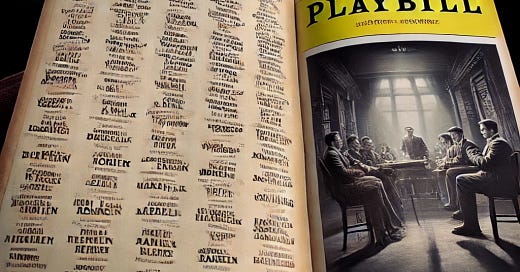In show business, people tend to work together many times, so if you look at a Broadway playbill or the credits of any movie or TV show, you're going to notice a lot of the same names popping up together.
Makes sense, right? In the entertainment business, we’re always assembling and reassembling teams for every project, so it's useful to know your collaborators beforehand.
That way, you’ve already worked through all of their quirks and annoying behavior, you already know that this person is going to drive you insane or that person is always late or this other person isn't going to say much at all but will chime in at the last minute with the solution. You know who's going to tell what story, who's vegan and wants to talk endlessly about it, and who has weird stuff going on at home that no one ever gets into.
In other words, all of the usual awkward friction among strangers working together for the first time isn't there. The team that already knows each other can focus on the task at hand. That's why people naturally choose to work with the devils they know. Friends, after all, are just irritating strangers we’ve gotten used to.
And the research seems to confirm this. Brian Uzzi is a professor at the Kellogg School of Business at Northwestern who investigated what kind of teams are the most successful.
He looked at the creative teams that assembled around the development of Broadway musicals from 1945 to 1989 and compared those to the resulting financial success of each show. What he learned was this: teams made up of people who had previously worked together produced more Broadway hits than the teams made up of people who were working together for the first time.
Which isn’t surprising. Those teams got down to the creative business at hand without a lot of distracting detours into forging secret alliances and passive-aggressive muttering and eye-rolling about someone else’s lunch order.
But Uzzi’s research, like a good Hollywood movie, also had a twist.
As financially successful as the already-familiar teams were, Broadway teams made up of a combination of already-familiars and new-to-each-others did even better.
Successful Broadway shows—but here I think you can substitute television, movies, music, phone apps, football teams, presidential administrations, newsrooms, whatever —came from teams with a mix, some level of familiarity mixed with some level of new weird people no one had met before.
The team gets reset, but not enough that it's a bunch of strangers trying to solve problems they've never encountered as a group before. Adding some new faces is a way of making the rest of the team work a little harder, take slightly bigger risks, form new social alliances.
It exactly what happens when your best friend in grammar school suddenly becomes best friends with the new kid. That can be deeply upsetting and make you cry into your pillow — so I hear — until you get up and wipe the snot off your face and decide to make some more friends, be more personally appealing, and decide that there’s room for one more in the friend group, even when you’re not sure what all the shoutin’s about with this new kid. Your friend’s new friend makes you a better friend. A little competition — in friendships and Broadway musical teams — makes everything better.
Besides, we all know the risks of being on a team that is smugly comfortable with each other. They can be too set in their ways, too this-is-the-way-we’ve-always-done-it. With teams like that, it’s hard for a new idea or perspective to break through. New things, like new people, can be scary and unsettling, but often that’s the best way to get fresh new work.
Most of us, of course, are not trying to produce the next Broadway hit. We’re just trying to get stuff done in the most efficient and effective way possible, in our careers and our lives. So it’s useful to remember that having a few strangers with strange ideas on the team — like, for instance, and I’m just throwing this out, some conservative journalists in the newsroom, maybe? — is the key to big success. Oh, sure, you’ll spend some time crying into your pillow, but eventually you’ll realize it makes everything better.



The perfect formula for a dinner party, too!